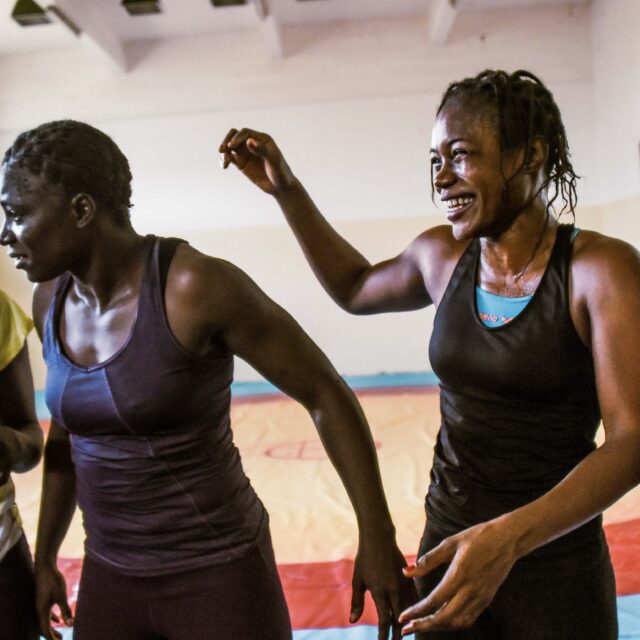Africa launches the largest trials of treatments for mild and moderate COVID-19 cases, mayors join forces to tackle gender inequality, and UK cuts its aid budget. Plus, a look at which countries have gender-balanced cabinets.
Here are six crucial stories you may have missed this month.
Africa’s largest COVID treatment trial launches
A network of 13 African countries joined forces with global researchers to launch Africa’s largest clinical trial of potential COVID-19 treatments. The Anticov study aims to identify treatments for mild and moderate COVID-19 cases early in order to prevent spikes in hospitalisation, which could overwhelm already overburdened health systems in Africa. The clinical trial will be carried out at 19 sites in 13 countries, led by African doctors. “There is a need for large clinical trials in Africa for COVID-19 to answer research questions that are specific to an African context,” said Dr John Nkengasong, director of the Africa Centres for Disease Control and Prevention. The initiative also involves Antwerp’s Institute of Tropical Medicine and international research institutions.
‘Feminist’ mayors come together to tackle global gender inequality
Six city mayors from three continents have launched a new network called City Hub and Network for Gender Equity (CHANGE) to fight gender inequality. Globally COVID-19 has impacted women’s jobs, unpaid labor, health, and safety, and these mayors argue that “local governments can and should lead.” Women’s jobs have been 1.8 times more vulnerable during the pandemic than men’s, according to McKinsey & Co. And government data shows that of the 1.1 million US workers who dropped out of the labor force in September, 80% were women. The CHANGE network aims to promote and share innovative projects focused on combating gender inequality with local governments around the world.
UK cuts its aid budget despite legal requirements
The UK will not spend 0.7% of gross national income on official development assistance next year, despite being legally committed to the target. Chancellor Rishi Sunak announced on 25 November that the government will instead allocate 0.5% of GNI (approximately £10 billion) to the aid budget in 2021 — a cut of around £5 billion compared to the 2019 budget. “This doesn’t just hurt the world’s poorest people, it has a real impact on people in the UK as well. It’s bad economics that will end up costing more than it saves,” Romilly Greenhill, UK Director for ONE said. The UK has spent 0.7% of GNI on aid since 2013. It was enshrined into law in 2015, and retaining the target was a Conservative Party manifesto promise, with the government insisting it would not be cut as recently as September, writes Devex.
11th Ebola outbreak in the Democratic Republic of the Congo declared over
The Democratic Republic of the Congo has declared its 11th Ebola outbreak over, as of 18 November, nearly six months after cases were first reported in Equateur Province. The outbreak was scattered across communities in dense rain forests, as well as crowded urban areas, creating logistical challenges in reaching patients and administering vaccinations. The World Health Organization is profiling the frontline workers who successfully tackled the outbreak.
A look at countries with gender-balanced cabinets
With US President-elect Joe Biden pledging a more gender-balanced cabinet, Thomson Reuters Foundation is asking: Which countries have already shattered glass ceilings with gender-balanced cabinets? Rwanda boasts by far the best record for female representation in politics, with nearly two-thirds of parliamentary seats and 52% of cabinet positions held by women. This high participation of women is attributed to Rwanda’s 2003 constitution, drafted after the 1994 genocide, that mandates no less than 30% of political seats are held by women. South Africa, Canada, and New Zealand also make the list, among others.
Devastation after Tropical Cyclone Gati hits Somalia
Somalia was hit by Tropical Cyclone Gati, the strongest storm on record to hit the country with winds of 105 miles per hour. The storm brought more than a year’s worth of rain in two days. An estimated 70,000 were impacted, with at least eight people dead and many displaced. Property, roads, and shipping and fishing activities were damaged and disrupted. “Most of the affected people are from pastoralist families, whose livelihoods had already been severely damaged by recurring droughts over the past few years. Their herds have dwindled, making their situation extremely difficult even before this storm hit,” said Mohamoud Hassan, country director for Save the Children, in a press release.



